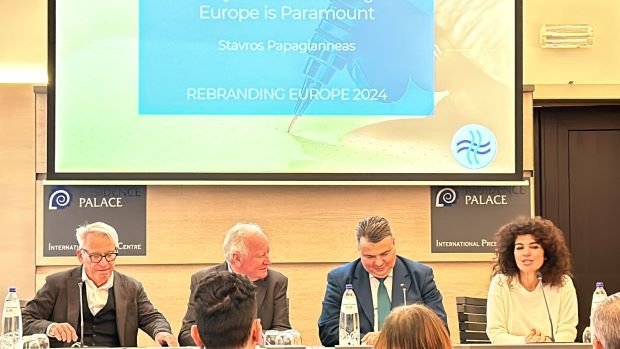- Daily & Weekly newsletters
- Buy & download The Bulletin
- Comment on our articles
Communicating the EU’s values and achievements is a priority, says author of ‘Rebranding Europe 2024’
The European Union’s response to the dual crises of the Covid pandemic and the invasion of Ukraine exemplify its global leadership role, according to Stavros Papagianneas, the author of Rebranding Europe 2024.
“We need a strong European Union,” he insisted, at the launch of the revised and expanded edition of his book in Brussels. "The Union is at a defining moment, at a crossroads. To secure its future, Europe needs to communicate a clear and compelling vision to its citizens and the world.”
In addition to the coronavirus crisis and war in Ukraine, the far right's rise in the latest European Parliament elections and several member states were further reasons to publish a follow-up work, said Papagianneas.
“This shift has eroded the presence of centrist parties, whose seat share has dropped from 85% to 65% over the past 15 years.”
Recognising the EU’s frequent failure to effectively communicate policies while having to navigate political shifts and global challenges, the senior communication strategist added: “It's not just about politics – it is about trust, identity and shared purpose."
On a practical level, Papagianneas’ recommendations for ‘rebranding Europe’ focus on the role of the media, political engagement, the common public European sphere and the success of the Erasmus education exchange programme. They also aim to counteract the apathy that persists in citizens’ perception of the institutions.
He suggested the EU bolster its strategic sovereignty while becoming less dependent on key technological areas, critical infrastructure and supply chains.
Another proposal was doubling the EU’s current budget for communications. “It’s currently tiny compared with the overall EU budget,” pointed out Papagianneas.
As in the first edition, published in 2017 as a response to the Brexit crisis, he conducted interviews with the press corps in Brussels. Again, journalists were critical of the EU’s stance in engaging with the media, its overuse of jargon and inability to use simple language.
The overriding message from those reporting within the EU bubble is that the role of media “is paramount” and that more space should be given to European news.

This was reiterated by Laurențiu Plosceanu, vice-president of the European Economic and Social Committee (EESC), who provided a foreword tor the book. “The vast majority of Europeans first think local, then regional, then national, and only at the very end European,” he said.
Recognising that policy decisions resonate differently depending on the member state, he continued: “The communication about Europe needs to adapt to this reality by recognising that the narratives to reach people need to be local, regional, national ones.”
Colin Stevens, chief-editor of EU Reporter, who moderated the presentation and debate, also acknowledged the vital role of media in the development of a European public sphere.
“We, the media, have to explain again and again that Europe concerns everybody. And we have to do this every day of the week. European topics should have a more important place in European media.”
Rebranding Europe 2024: Fundamentals for Communicating the United States of Europe is available online and in selected bookstores.
Photo: Stavros Papagianneas; Laurențiu Plosceanu; Colin Stevens; Amalia Tsoumani ©Stp Communications

















